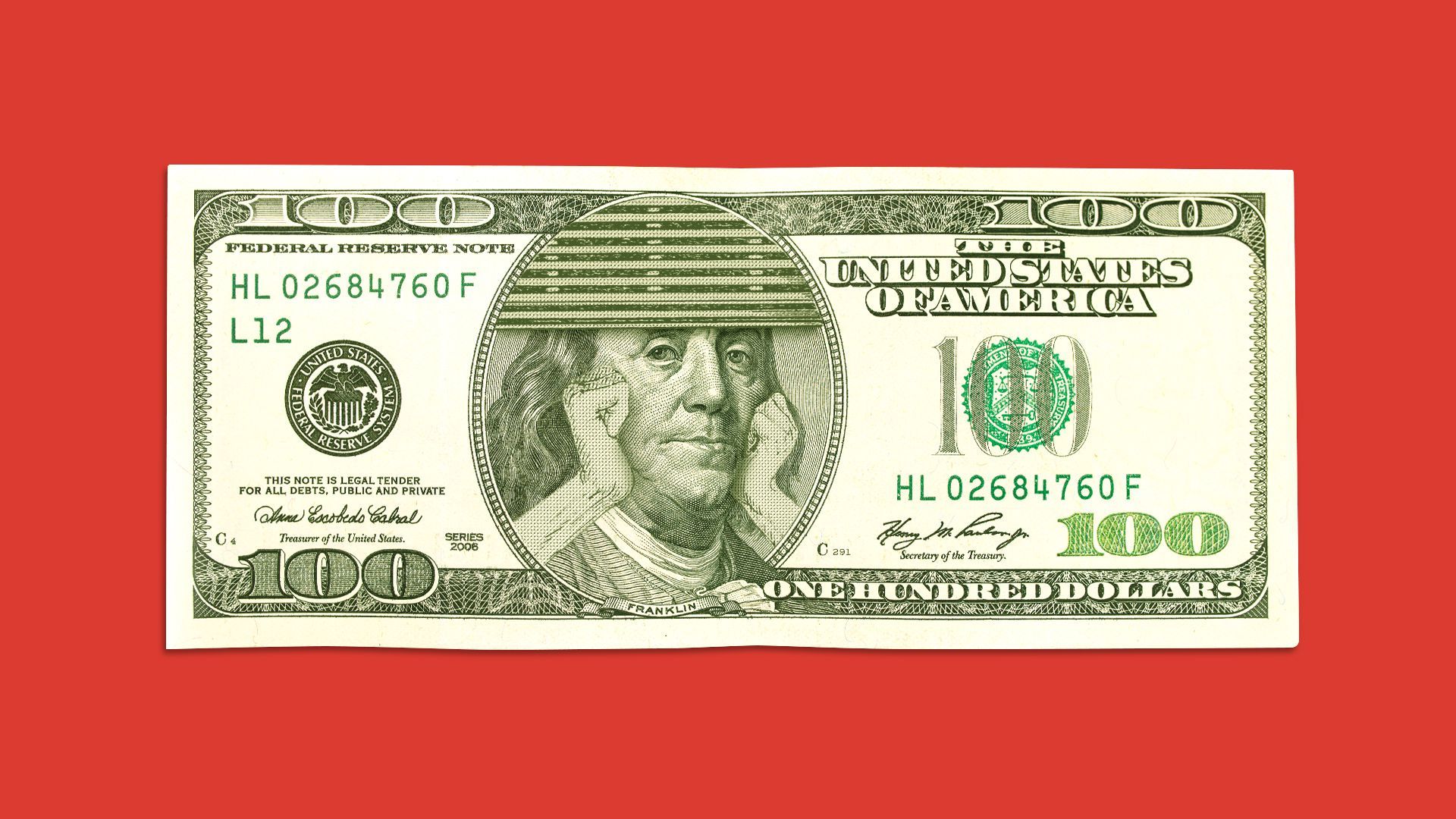| | | | | | | Presented By Raytheon Technologies | | | | Axios Markets | | By Courtenay Brown ·Nov 16, 2020 | | Welcome back. If this email was forwarded to you, sign up here. (Today's Smart Brevity count: 1,226 words, < 5 minutes.) 🚨 Situational awareness: Moderna says preliminary trial data show its COVID-19 vaccine is 94.5% effective. (Axios) 🎙 "The way to begin is to begin. When you make a start, everything will be smoothed out by practice." — See who said it and why it matters below. | | | | | | 1 big thing: Economic fallout of lockdown 2.0 |  | | | Illustration: Aïda Amer/Axios | | | | America is facing its worst rate of new coronavirus infections — and widespread sickness is expected to be compounded by economic pain from the necessary lockdown measures, much like we saw earlier this year. Why it matters: What's different now is the lack of near-term hope for stimulus as the country tries to control the virus — at a time when economists say it's critical to mitigate fallout for the unemployed, businesses and municipalities. - The key will be whether "policymakers in Congress can extend the income bridge" and prevent "a second-round negative impact on the economy from the deterioration in state and local budgets," economists at Brean Capital said in a client note.
The big questions: If and when Congress will make progress on a deal. And what the Fed can do — or will do — on its own to provide economic support. - Meanwhile, the Federal Reserve and Congress have been pointing fingers at one another to step in.
On one side: Fed chair Jerome Powell has for months hinted at Congress in public comments — noting that an economic recovery could stall without additional fiscal support. - He's claimed over and over the Fed has "lending not spending powers," meaning it can't dole out aid in the form of cash or grants — what's most needed for struggling entities — the way Congress can.
On the other side: Democrats have been advocating for the Fed to extend its emergency relief programs set to expire next month — a fight that could come to a head in coming weeks. - Democrats "are eyeing the programs as a backup option if they can't strike a deal to aid states and localities," the New York Times reported last week.
Driving the news: Two more states put partial lockdowns in place over the weekend through early December. - Michigan and Washington State said they will ban indoor dining and shut down some entertainment venues.
- In Michigan, high schools and colleges are ordered to move online, while people are mandated work from home where possible.
Between the lines: So far, the lockdown measures aren't as stringent as earlier this year. But they will curb economic activity. - "This bodes badly for businesses as they are unlikely to have the same fiscal support they received over the summer as Congress and the White House remain at an impasse on stimulus negotiations," Joseph Song, senior U.S. economist at Bank of America, wrote in a note on Friday.
- "More businesses will be at risk of permanently going out of business, which would dampen labor demand and potentially spur new rounds of layoffs," Song said.
What to watch: Powell did acknowledge that along with Congress, the Fed will "likely need to do more," during a virtual panel with Europe and England's central bank chiefs last week. - The Fed could announce more policy responses at its meeting in December or possibly before, "with COVID-19 intensifying and fiscal stimulus caught in the Bermuda triangle of a partisan, lame duck Congress," Standard Chartered Bank's Steve Englander predicted in a note on Friday.
- Englander expects the Fed to increase the pace of bond buying, which Powell alluded to at the policy meeting earlier this month. The Fed could also "add targeted measures to encourage credit provision to struggling businesses, limited to loans on good collateral."
But, but, but: Englander doesn't see these "measures as substitutes for fiscal policy, but somewhat effective measures are preferable to no measures" for the Fed. |     | | | | | | Bonus chart: Small company stocks thrive |  Data: FactSet; Chart: Axios Visuals An index of America's smallest companies closed at the highest level ever on Friday. It hasn't hit a new record in over two years. Why it matters: The gulf between the biggest and smallest companies widened at the onset of the pandemic — with smaller companies (whose businesses are the most closely tied to the U.S. economy) seen as hit the hardest by the economic effects from COVID-19. - Yes, but: That idea has been over on Wall Street, with the gap between large caps and small caps narrowing in recent months.
Driving the news: This week, the index surged on the back of positive developments from a coronavirus vaccine. - The Russell 2000 is up 13% so far this month — outpacing the S&P 500's 9.6% gain. (The S&P 500 is still outperforming for all of 2020.)
|     | | | | | | 2. Catch up quick | | The U.S. recorded more than 1 million new COVID-19 cases in the past 6 days. (Axios) PNC is buying BBVA's U.S. banking arm for more than $11.6 billion in an all-cash deal — the 2nd biggest banking deal since the 2008 financial crisis. (CNBC) Japan's economy — the third largest in the world — is growing again for the first time in four quarters. (Nikkei Asia) - The 21.4% annualized growth rate in Q3 claws back about half of Japan's growth lost since last year.
SEC chairman Jay Clayton will step down by the end of the year. (NYT) |     | | | | | | A message from Raytheon Technologies | | The future of aerospace and defense is here | | |  | | | | At Raytheon Technologies, nearly 200,000 engineers, scientists and researchers are pushing the limits of known science to explore deep space, advance aviation and build smarter defense systems that protect all of us here at home. That's the future of aerospace and defense. Learn more at RTX.com | | | | | | 3. China's new world order |  Map: Danielle Alberti/Axios The largest free trade area in the world came into existence over the weekend — and the U.S. was not even invited, Axios' Felix Salmon writes. Why it matters: For the first time in living memory, the hegemon at the center of a major global free trade agreement is not the United States. - China has stepped into Uncle Sam's shoes, and now anchors the Regional Comprehensive Economic Partnership, or RCEP, an area covering 2.2 billion people and 1/3 of all the economic activity on the planet.
The big picture: President-elect Joe Biden is expected to seek a broad multilateral alliance to pressure China on everything from trade to human rights once he becomes president. But China is making broad multilateral alliances of its own. - RCEP includes rich democracies such as South Korea, Japan, and Australia. Their position in this major free trade area will make it that much harder for Biden to unite them against China.
Flashback: The Obama administration was explicit that the U.S. should be the anchor of a Pacific Rim trade agreement, the TPP, that pointedly excluded China. - "China is negotiating a trade deal that would carve up some of the fastest-growing markets in the world at our expense," wrote then-President Obama in 2016.
- That trade deal is now reality, while America has pulled out of the TPP. There is very little chance that the U.S. will rejoin it under Biden's presidency.
The bottom line: Big new trade pacts are extremely difficult to negotiate. - China showed real determination in getting this one done, even as the U.S. demonstrated almost no interest in improving or even maintaining economic relations with the region.
- China's partners in RCEP are likely to remember for many years which of the two giants was more reliable.
|     | | | | | | 4. 👀 Who's vying for White House economic posts | | Axios' Hans Nichols reports: Most of the advisers in contention for in-house economic positions in the Biden White House are more progressive than most of the candidates the president-elect is considering for Treasury secretary, sources familiar with the process tell Axios. State of play: Current Fed governor Lael Brainard appears to be the leading candidate to serve as Treasury secretary. - Others under consideration: Janet Yellen, Sarah Bloom Raskin, Roger Ferguson and Raphael Bostic.
Other names to watch: Jared Bernstein, who consistently argued for more spending and regulation as Biden's first economic adviser in the Obama White House, is a leading candidate to run NEC. - Ben Harris could head either the NEC or the Office of Management and Budget, or end up in a sub-Cabinet position at Treasury.
- Heather Boushey is also a possibility for the NEC, as well the Council of Economic Advisers or the Domestic Policy Council.
- Gene Sperling could return for a third tour at the Council or Management and Budget, or as a senior White House adviser.
See the full list. |     | | | | | | A message from Raytheon Technologies | | The future of aerospace and defense is here | | |  | | | | At Raytheon Technologies, nearly 200,000 engineers, scientists and researchers are pushing the limits of known science to explore deep space, advance aviation and build smarter defense systems that protect all of us here at home. That's the future of aerospace and defense. Learn more at RTX.com | | | | Reply to this email with tips, questions, suggestions or the best episode(s) from the new season of "The Crown." See you back here tomorrow. Quote: "The way to begin is to begin. When you make a start, everything will be smoothed out by practice." Why it matters: These were part of the instructions then-Treasury Secretary William Gibbs McAdoo gave 12 Federal Reserve Banks — before they opened for business across the country on this day in 1914. (Check out the original announcement.) | | | | Axios thanks our partners for supporting our newsletters.
Sponsorship has no influence on editorial content. Axios, 3100 Clarendon Blvd, Suite 1300, Arlington VA 22201 | | | You received this email because you signed up for newsletters from Axios.
Change your preferences or unsubscribe here. | | | Was this email forwarded to you?
Sign up now to get Axios in your inbox. | | | | Follow Axios on social media:    | | | | | |






No comments:
Post a Comment